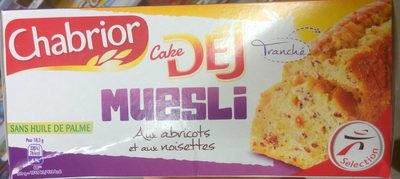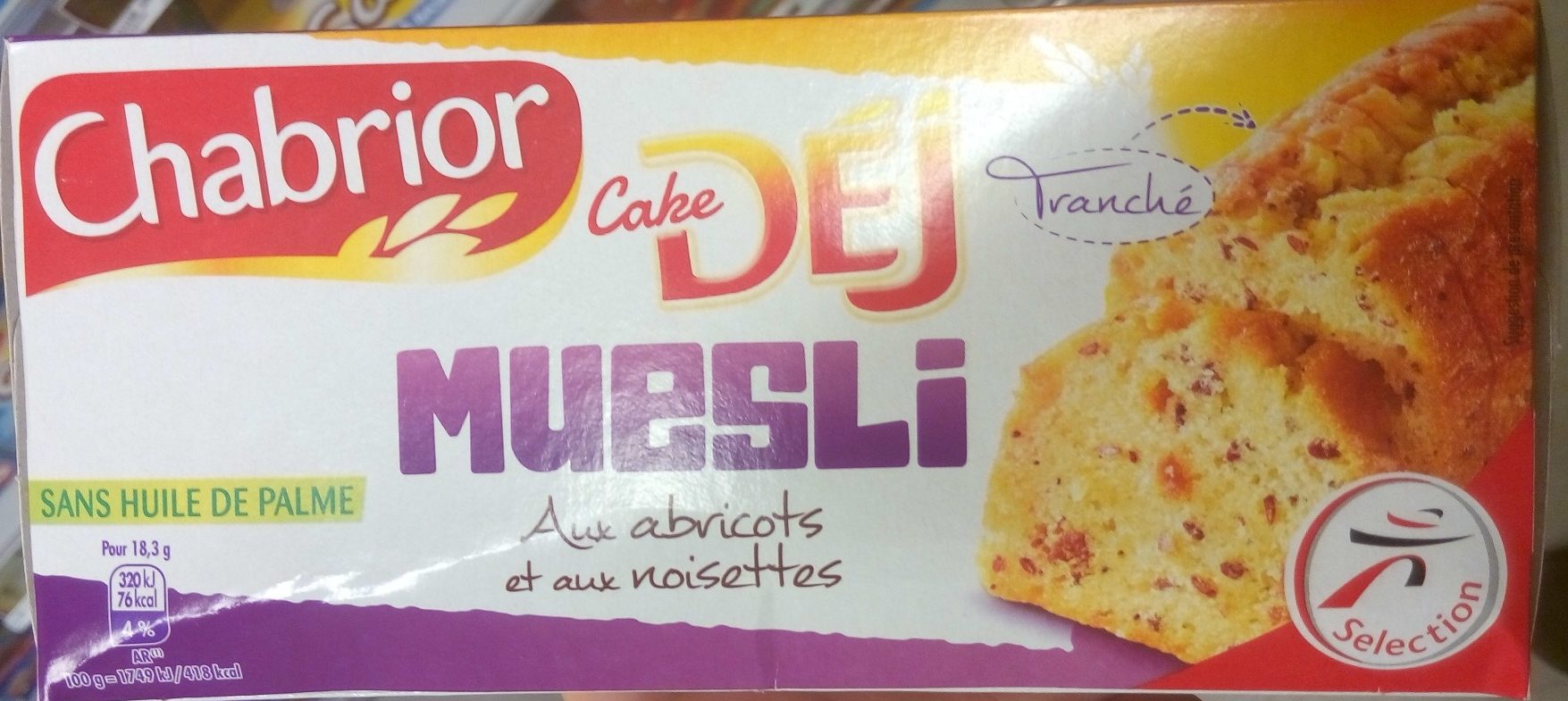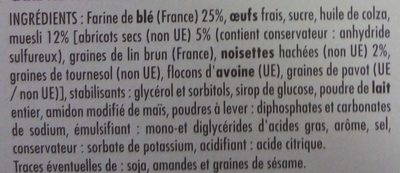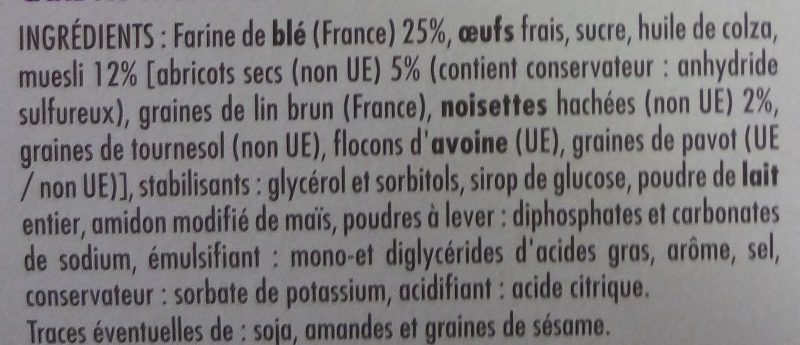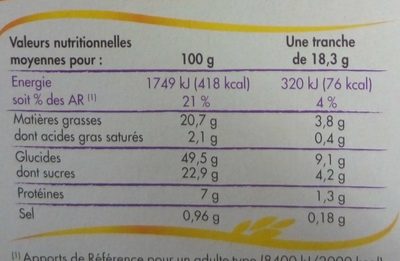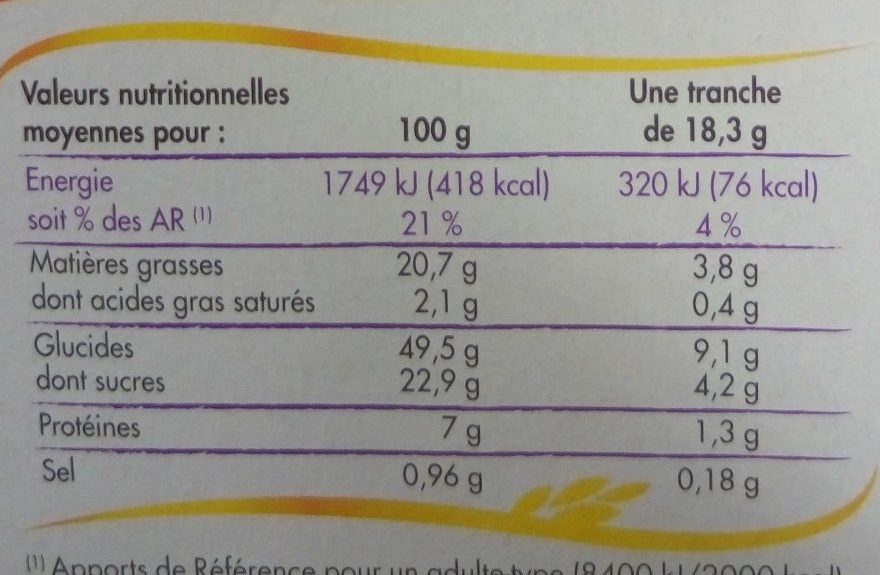Help us make food transparency the norm!
As a non-profit organization, we depend on your donations to continue informing consumers around the world about what they eat.
The food revolution starts with you!
Cake Déj Muesli aux abricots et aux noisettes - Chabrior - 220 g
Cake Déj Muesli aux abricots et aux noisettes - Chabrior - 220 g
Important note: this product is no longer sold. The data is kept for reference only. This product does not appear in regular searches and is not taken into account for statistics.
This product page is not complete. You can help to complete it by editing it and adding more data from the photos we have, or by taking more photos using the app for Android or iPhone/iPad. Thank you!
×
Some of the data for this product has been provided directly by the manufacturer INTERMARCHÉ.
Barcode: 3250392246570 (EAN / EAN-13)
Quantity: 220 g
Packaging: Cardboard
Brands: Chabrior
Categories: Snacks, Desserts, Sweet snacks, Biscuits and cakes, Cakes, Fruit cakes
Labels, certifications, awards:
Distributor labels, Green Dot, No palm oil, fr:Sélection Intermarché
Origin of ingredients: France, European Union
Manufacturing or processing places: France
Traceability code: EMB 49333 - Seiches-sur-le-Loir (Maine-et-Loire, France)
Stores: Intermarché
Countries where sold: France
Matching with your preferences
Health
Ingredients
-
29 ingredients
French: Farine de blé (France) 25%, œufs frais, sucre, huile de colza, muesli 12% [abricots secs (non UE) 5% (contient conservateur : anhydride sulfureux), graines de lin brun (France), noisettes hachées (non UE) 2%, graines de tournesol (non UE), flocons d'avoine (UE), graines de pavot (UE / non UE)], stabilisants : glycérol et sorbitols, sirop de glucose, poudre de lait entier, amidon modifié de maïs, poudres à lever : diphosphates et carbonates de sodium, émulsifiant : mono - et diglycérides d'acides gras, arôme, sel, conservateur : sorbate de potassium, acidifiant : acide citrique.Allergens: Eggs, Gluten, Milk, NutsTraces: Nuts, Sesame seeds, Soybeans
Food processing
-
Ultra processed foods
Elements that indicate the product is in the 4 - Ultra processed food and drink products group:
- Additive: E14XX - Modified Starch
- Additive: E420 - Sorbitol
- Additive: E422 - Glycerol
- Additive: E450 - Diphosphates
- Additive: E471 - Mono- and diglycerides of fatty acids
- Ingredient: Emulsifier
- Ingredient: Flavouring
- Ingredient: Glucose
- Ingredient: Glucose syrup
Food products are classified into 4 groups according to their degree of processing:
- Unprocessed or minimally processed foods
- Processed culinary ingredients
- Processed foods
- Ultra processed foods
The determination of the group is based on the category of the product and on the ingredients it contains.
Additives
-
E202 - Potassium sorbate
Potassium sorbate (E202) is a synthetic food preservative commonly used to extend the shelf life of various food products.
It works by inhibiting the growth of molds, yeast, and some bacteria, preventing spoilage. When added to foods, it helps maintain their freshness and quality.
Some studies have shown that when combined with nitrites, potassium sorbate have genotoxic activity in vitro. However, potassium sorbate is generally recognized as safe (GRAS) by regulatory authorities.
-
E220 - Sulphur dioxide
Sulfur dioxide: Sulfur dioxide -also sulphur dioxide in British English- is the chemical compound with the formula SO2. It is a toxic gas with a burnt match smell. It is released naturally by volcanic activity and is produced as a by-product of the burning of fossil fuels contaminated with sulfur compounds.Source: Wikipedia
-
E330 - Citric acid
Citric acid is a natural organic acid found in citrus fruits such as lemons, oranges, and limes.
It is widely used in the food industry as a flavor enhancer, acidulant, and preservative due to its tart and refreshing taste.
Citric acid is safe for consumption when used in moderation and is considered a generally recognized as safe (GRAS) food additive by regulatory agencies worldwide.
-
E420 - Sorbitol
Sorbitol: Sorbitol --, less commonly known as glucitol --, is a sugar alcohol with a sweet taste which the human body metabolizes slowly. It can be obtained by reduction of glucose, which changes the aldehyde group to a hydroxyl group. Most sorbitol is made from corn syrup, but it is also found in nature, for example in apples, pears, peaches, and prunes. It is converted to fructose by sorbitol-6-phosphate 2-dehydrogenase. Sorbitol is an isomer of mannitol, another sugar alcohol; the two differ only in the orientation of the hydroxyl group on carbon 2. While similar, the two sugar alcohols have very different sources in nature, melting points, and uses.Source: Wikipedia
-
E422 - Glycerol
Glycerol: Glycerol -; also called glycerine or glycerin; see spelling differences- is a simple polyol compound. It is a colorless, odorless, viscous liquid that is sweet-tasting and non-toxic. The glycerol backbone is found in all lipids known as triglycerides. It is widely used in the food industry as a sweetener and humectant and in pharmaceutical formulations. Glycerol has three hydroxyl groups that are responsible for its solubility in water and its hygroscopic nature.Source: Wikipedia
-
E450 - Diphosphates
Diphosphates (E450) are food additives often utilized to modify the texture of products, acting as leavening agents in baking and preventing the coagulation of canned food.
These salts can stabilize whipped cream and are also found in powdered products to maintain their flow properties. They are commonly present in baked goods, processed meats, and soft drinks.
Derived from phosphoric acid, they're part of our daily phosphate intake, which often surpasses recommended levels due to the prevalence of phosphates in processed foods and drinks.
Excessive phosphate consumption is linked to health issues, such as impaired kidney function and weakened bone health. Though diphosphates are generally regarded as safe when consumed within established acceptable daily intakes, it's imperative to monitor overall phosphate consumption to maintain optimal health.
-
E471 - Mono- and diglycerides of fatty acids
Mono- and diglycerides of fatty acids (E471), are food additives commonly used as emulsifiers in various processed foods.
These compounds consist of glycerol molecules linked to one or two fatty acid chains, which help stabilize and blend water and oil-based ingredients. E471 enhances the texture and shelf life of products like margarine, baked goods, and ice cream, ensuring a smooth and consistent texture.
It is generally considered safe for consumption within established regulatory limits.
-
E500 - Sodium carbonates
Sodium carbonates (E500) are compounds commonly used in food preparation as leavening agents, helping baked goods rise by releasing carbon dioxide when they interact with acids.
Often found in baking soda, they regulate the pH of food, preventing it from becoming too acidic or too alkaline. In the culinary world, sodium carbonates can also enhance the texture and structure of foods, such as noodles, by modifying the gluten network.
Generally recognized as safe, sodium carbonates are non-toxic when consumed in typical amounts found in food.
Ingredients analysis
-
May contain palm oil
Ingredients that may contain palm oil: E471
-
Non-vegan
Non-vegan ingredients: Fresh egg, Whole milk powder
-
Vegetarian status unknown
Unrecognized ingredients: Müesli
-
Details of the analysis of the ingredients
fr: Farine de blé 25%, œufs frais, sucre, huile de colza, muesli 12% (abricots secs 5%, contient conservateur (anhydride sulfureux), graines de lin brun, noisettes 2%, graines de tournesol, flocons d'avoine, graines de pavot), stabilisants (glycérol et sorbitols), sirop de glucose, poudre de lait entier, amidon modifié de maïs, poudres à lever (diphosphates de sodium), carbonates de sodium, émulsifiant (mono- et diglycérides d'acides gras), arôme, sel, conservateur (sorbate de potassium), acidifiant (acide citrique)- Farine de blé -> en:wheat-flour - vegan: yes - vegetarian: yes - ciqual_proxy_food_code: 9410 - percent_min: 25 - percent: 25 - percent_max: 25
- œufs frais -> en:fresh-egg - vegan: no - vegetarian: yes - ciqual_food_code: 22000 - percent_min: 12 - percent_max: 25
- sucre -> en:sugar - vegan: yes - vegetarian: yes - ciqual_proxy_food_code: 31016 - percent_min: 12 - percent_max: 22.9
- huile de colza -> en:colza-oil - vegan: yes - vegetarian: yes - from_palm_oil: no - ciqual_food_code: 17130 - percent_min: 12 - percent_max: 22
- muesli -> en:muesli - percent_min: 12 - percent: 12 - percent_max: 12
- abricots secs -> en:dried-apricots - vegan: yes - vegetarian: yes - percent_min: 5 - percent: 5 - percent_max: 5
- contient conservateur -> en:preservative - percent_min: 2 - percent_max: 3
- anhydride sulfureux -> en:e220 - vegan: yes - vegetarian: yes - percent_min: 2 - percent_max: 3
- graines de lin brun -> en:brown-flax-seeds - vegan: yes - vegetarian: yes - ciqual_food_code: 15052 - percent_min: 2 - percent_max: 3
- noisettes -> en:hazelnut - vegan: yes - vegetarian: yes - ciqual_food_code: 15004 - percent_min: 2 - percent: 2 - percent_max: 2
- graines de tournesol -> en:sunflower-seed - vegan: yes - vegetarian: yes - ciqual_food_code: 15011 - percent_min: 0 - percent_max: 1
- flocons d'avoine -> en:oat-flakes - vegan: yes - vegetarian: yes - ciqual_food_code: 9311 - percent_min: 0 - percent_max: 0.75
- graines de pavot -> en:poppyseed - vegan: yes - vegetarian: yes - ciqual_food_code: 11061 - percent_min: 0 - percent_max: 0.6
- stabilisants -> en:stabiliser - percent_min: 0 - percent_max: 9.75
- glycérol et sorbitols -> fr:sorbitols-et-glycerol - vegan: yes - vegetarian: yes - percent_min: 0 - percent_max: 9.75
- sirop de glucose -> en:glucose-syrup - vegan: yes - vegetarian: yes - percent_min: 0 - percent_max: 7.8
- poudre de lait entier -> en:whole-milk-powder - vegan: no - vegetarian: yes - ciqual_food_code: 19021 - percent_min: 0 - percent_max: 6.5
- amidon modifié de maïs -> en:modified-corn-starch - vegan: yes - vegetarian: yes - ciqual_food_code: 9510 - percent_min: 0 - percent_max: 5.57142857142857
- poudres à lever -> en:raising-agent - percent_min: 0 - percent_max: 4.875
- diphosphates de sodium -> en:e450i - vegan: yes - vegetarian: yes - percent_min: 0 - percent_max: 4.875
- carbonates de sodium -> en:e500 - vegan: yes - vegetarian: yes - percent_min: 0 - percent_max: 4.33333333333333
- émulsifiant -> en:emulsifier - percent_min: 0 - percent_max: 3.9
- mono- et diglycérides d'acides gras -> en:e471 - vegan: maybe - vegetarian: maybe - from_palm_oil: maybe - percent_min: 0 - percent_max: 3.9
- arôme -> en:flavouring - vegan: maybe - vegetarian: maybe - percent_min: 0 - percent_max: 3.54545454545455
- sel -> en:salt - vegan: yes - vegetarian: yes - ciqual_food_code: 11058 - percent_min: 0 - percent_max: 0.96
- conservateur -> en:preservative - percent_min: 0 - percent_max: 0.96
- sorbate de potassium -> en:e202 - vegan: yes - vegetarian: yes - percent_min: 0 - percent_max: 0.96
- acidifiant -> en:acid - percent_min: 0 - percent_max: 0.96
- acide citrique -> en:e330 - vegan: yes - vegetarian: yes - percent_min: 0 - percent_max: 0.96
Nutrition
-
Poor nutritional quality
⚠ ️Warning: the amount of fiber is not specified, their possible positive contribution to the grade could not be taken into account.⚠ ️Warning: the amount of fruits, vegetables and nuts is not specified on the label, it was estimated from the list of ingredients: 24This product is not considered a beverage for the calculation of the Nutri-Score.
Positive points: 0
- Proteins: 4 / 5 (value: 7, rounded value: 7)
- Fiber: 0 / 5 (value: 0, rounded value: 0)
- Fruits, vegetables, nuts, and colza/walnut/olive oils: 0 / 5 (value: 24, rounded value: 24)
Negative points: 16
- Energy: 5 / 10 (value: 1749, rounded value: 1749)
- Sugars: 5 / 10 (value: 22.9, rounded value: 22.9)
- Saturated fat: 2 / 10 (value: 2.1, rounded value: 2.1)
- Sodium: 4 / 10 (value: 384, rounded value: 384)
The points for proteins are not counted because the negative points are greater or equal to 11.
Nutritional score: (16 - 0)
Nutri-Score:
-
Nutrient levels
-
Fat in high quantity (20.7%)
What you need to know- A high consumption of fat, especially saturated fats, can raise cholesterol, which increases the risk of heart diseases.
Recommendation: Limit the consumption of fat and saturated fat- Choose products with lower fat and saturated fat content.
-
Saturated fat in moderate quantity (2.1%)
What you need to know- A high consumption of fat, especially saturated fats, can raise cholesterol, which increases the risk of heart diseases.
Recommendation: Limit the consumption of fat and saturated fat- Choose products with lower fat and saturated fat content.
-
Sugars in high quantity (22.9%)
What you need to know- A high consumption of sugar can cause weight gain and tooth decay. It also augments the risk of type 2 diabetes and cardio-vascular diseases.
Recommendation: Limit the consumption of sugar and sugary drinks- Sugary drinks (such as sodas, fruit beverages, and fruit juices and nectars) should be limited as much as possible (no more than 1 glass a day).
- Choose products with lower sugar content and reduce the consumption of products with added sugars.
-
Salt in moderate quantity (0.96%)
What you need to know- A high consumption of salt (or sodium) can cause raised blood pressure, which can increase the risk of heart disease and stroke.
- Many people who have high blood pressure do not know it, as there are often no symptoms.
- Most people consume too much salt (on average 9 to 12 grams per day), around twice the recommended maximum level of intake.
Recommendation: Limit the consumption of salt and salted food- Reduce the quantity of salt used when cooking, and don't salt again at the table.
- Limit the consumption of salty snacks and choose products with lower salt content.
-
-
Nutrition facts
Nutrition facts As sold
for 100 g / 100 mlAs sold
per serving (18,3 g)Compared to: Fruit cakes Energy 1,749 kj
(418 kcal)320 kj
(76 kcal)+10% Fat 20.7 g 3.79 g +40% Saturated fat 2.1 g 0.384 g -54% Carbohydrates 49.5 g 9.06 g -10% Sugars 22.9 g 4.19 g -30% Fiber ? ? Proteins 7 g 1.28 g +45% Salt 0.96 g 0.176 g +78% Fruits‚ vegetables‚ nuts and rapeseed‚ walnut and olive oils (estimate from ingredients list analysis) 24 % 24 %
Environment
-
Eco-Score B - Low environmental impact
⚠ ️Select a country in order to include the full impact of transportation.The Eco-Score is an experimental score that summarizes the environmental impacts of food products.→ The Eco-Score was initially developped for France and it is being extended to other European countries. The Eco-Score formula is subject to change as it is regularly improved to make it more precise and better suited to each country.Life cycle analysis
-
Average impact of products of the same category: B (Score: 74/100)
Category: Fruit cake
Category: Fruit cake
- PEF environmental score: 0.32 (the lower the score, the lower the impact)
- including impact on climate change: 2.51 kg CO2 eq/kg of product
Stage Impact Agriculture
75.3 %Processing
12.2 %Packaging
7.4 %Transportation
3.5 %Distribution
1.5 %Consumption
0.0 %
Bonuses and maluses
-
Origins of ingredients with a medium impact
Bonus: +1
Environmental policy: +1
Transportation: 0
Origin of the product and/or its ingredients % of ingredients Impact France 60 %Medium European Union 33 %High Unknown 7 %High European Union and Non European Union 0 %High
-
Packaging with a low impact
Malus: -1
Shape Material Recycling Impact Unknown Cardboard Low ⚠ ️ The information about the packaging of this product is not sufficiently precise (exact shapes and materials of all components of the packaging).⚠ ️ For a more precise calculation of the Eco-Score, you can modify the product page and add them.
If you are the manufacturer of this product, you can send us the information with our free platform for producers.
Eco-Score for this product
-
Impact for this product: B (Score: 74/100)
Product: Cake Déj Muesli aux abricots et aux noisettes - Chabrior - 220 g
Life cycle analysis score: 74
Sum of bonuses and maluses: 0
Final score: 74/100
-
Carbon footprint
-
Equal to driving 1.3 km in a petrol car
251 g CO² per 100g of product
The carbon emission figure comes from ADEME's Agribalyse database, for the category: Fruit cake (Source: ADEME Agribalyse Database)
Stage Impact Agriculture
74.0 %Processing
8.5 %Packaging
11.2 %Transportation
5.5 %Distribution
0.8 %Consumption
0.0 %
Packaging
-
Packaging with a low impact
-
Packaging parts
(Cardboard)
-
Packaging materials
Material % Packaging weight Packaging weight per 100 g of product Paper or cardboard
-
Transportation
-
Origins of ingredients
Origins of ingredients with a medium impact
Origin of the product and/or its ingredients % of ingredients Impact France 60 %Medium European Union 33 %High Unknown 7 %High European Union and Non European Union 0 %High
Report a problem
-
Incomplete or incorrect information?
Category, labels, ingredients, allergens, nutritional information, photos etc.
If the information does not match the information on the packaging, please complete or correct it. Open Food Facts is a collaborative database, and every contribution is useful for all.
Data sources
Product added on by sebleouf
Last edit of product page on by org-intermarche.
Product page also edited by packbot, quechoisir, spotter, tacite.
